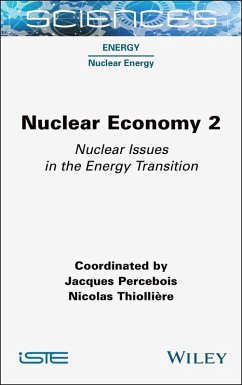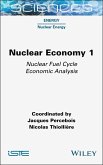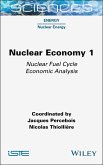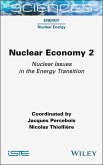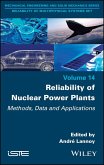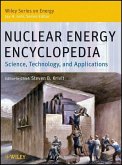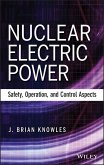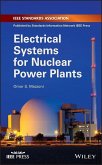Nuclear Economy 2 (eBook, ePUB)
Nuclear Issues in the Energy Transition
Redaktion: Percebois, Jacques; Thiolliere, Nicolas


Alle Infos zum eBook verschenken

Nuclear Economy 2 (eBook, ePUB)
Nuclear Issues in the Energy Transition
Redaktion: Percebois, Jacques; Thiolliere, Nicolas
- Format: ePub
- Merkliste
- Auf die Merkliste
- Bewerten Bewerten
- Teilen
- Produkt teilen
- Produkterinnerung
- Produkterinnerung

Hier können Sie sich einloggen

Bitte loggen Sie sich zunächst in Ihr Kundenkonto ein oder registrieren Sie sich bei bücher.de, um das eBook-Abo tolino select nutzen zu können.
This book presents the factual, precise, complete and accessible economic elements of nuclear energy in order to contribute to an informed and dispassionate debate. It analyzes the economic aspects of spent fuel management, including the costs and financing of long-term storage and deep geological disposal. The economic costs of a nuclear accident are also discussed from both theoretical and applied angles, based on the Fukushima nuclear disaster. Nuclear Economy 2 also examines the industrial and political aspects of the future energy mix. Nuclear energy is thus placed in the more global…mehr
- Geräte: eReader
- mit Kopierschutz
- eBook Hilfe
- Größe: 3.15MB
![Nuclear Economy 1 (eBook, ePUB) Nuclear Economy 1 (eBook, ePUB)]() Nuclear Economy 1 (eBook, ePUB)142,99 €
Nuclear Economy 1 (eBook, ePUB)142,99 €![Nuclear Economy 1 (eBook, PDF) Nuclear Economy 1 (eBook, PDF)]() Nuclear Economy 1 (eBook, PDF)142,99 €
Nuclear Economy 1 (eBook, PDF)142,99 €![Nuclear Economy 2 (eBook, PDF) Nuclear Economy 2 (eBook, PDF)]() Nuclear Economy 2 (eBook, PDF)142,99 €
Nuclear Economy 2 (eBook, PDF)142,99 €![Reliability of Nuclear Power Plants (eBook, ePUB) Reliability of Nuclear Power Plants (eBook, ePUB)]() Reliability of Nuclear Power Plants (eBook, ePUB)126,99 €
Reliability of Nuclear Power Plants (eBook, ePUB)126,99 €![Nuclear Energy Encyclopedia (eBook, ePUB) Nuclear Energy Encyclopedia (eBook, ePUB)]() Nuclear Energy Encyclopedia (eBook, ePUB)252,99 €
Nuclear Energy Encyclopedia (eBook, ePUB)252,99 €![Nuclear Electric Power (eBook, ePUB) Nuclear Electric Power (eBook, ePUB)]() J. Brian KnowlesNuclear Electric Power (eBook, ePUB)112,99 €
J. Brian KnowlesNuclear Electric Power (eBook, ePUB)112,99 €![Electrical Systems for Nuclear Power Plants (eBook, ePUB) Electrical Systems for Nuclear Power Plants (eBook, ePUB)]() Omar S. MazzoniElectrical Systems for Nuclear Power Plants (eBook, ePUB)114,99 €
Omar S. MazzoniElectrical Systems for Nuclear Power Plants (eBook, ePUB)114,99 €-
-
-
Dieser Download kann aus rechtlichen Gründen nur mit Rechnungsadresse in A, B, BG, CY, CZ, D, DK, EW, E, FIN, F, GR, HR, H, IRL, I, LT, L, LR, M, NL, PL, P, R, S, SLO, SK ausgeliefert werden.
- Produktdetails
- Verlag: John Wiley & Sons
- Seitenzahl: 272
- Erscheinungstermin: 11. Dezember 2023
- Englisch
- ISBN-13: 9781394257362
- Artikelnr.: 69661049
- Verlag: John Wiley & Sons
- Seitenzahl: 272
- Erscheinungstermin: 11. Dezember 2023
- Englisch
- ISBN-13: 9781394257362
- Artikelnr.: 69661049
- Herstellerkennzeichnung Die Herstellerinformationen sind derzeit nicht verfügbar.
Jacques CANTARELLA, Cécile EVANS, Pierre KUNSCH, Didier LÉONARD and
Jean-Paul MINON
1.1 Spent fuel management strategies and costs 1
1.1.1 The different options of the cycle 2
1.1.2 Characteristics of the cycle options 8
1.1.3 Economic evaluations 10
1.1.4 Deep storage as a preferred solution 14
1.2 Costs and methods of financing radioactive waste management 15
1.2.1 Introduction 15
1.2.2 Analysis of the costs related to the long-term management of
radioactive waste 17
1.2.3 Financing the long-term management of radioactive waste 42
1.2.4 Conclusion on the costs and financing of waste storage 63
1.3 References 64
Chapter 2 Nuclear Power in the European Electricity Market 67
Jacques PERCEBOIS and Boris SOLIER
2.1 The functionality of the wholesale electricity market 69
2.2 The price set by the merit order of marginal costs 71
2.3 Nuclear power and the wholesale price of electricity 75
2.4 The need for a capacity market 82
2.5 The carbon market and spot market in Europe 84
2.6 Accounting for the system costs in the merit order 87
2.6.1 Crowd-out cost of controllable power plants 88
2.6.2 Back-up of non-controllable power plants 90
2.6.3 Rates based on costs 94
2.7 The case of nuclear power and the ARENH mechanism, a hindrance to the
market 95
2.7.1 The ARENH, a "canal lock" for removing rents 95
2.7.2 ARENH reform projects 103
2.8 Conclusion 113
2.9 References 114
Chapter 3 The Industrial Challenges of Nuclear Power 117
Xavier URSAT
3.1 Nuclear power, part of the energy transition 118
3.1.1 Nuclear power, the third largest industrial sector in France 118
3.1.2 The EPR, a nuclear technology of the future 120
3.1.3 NUWARD, the French project for SMRs 121
3.2 A sector committed to a dynamic of deep transformation 122
3.2.1 The restructuring of the nuclear sector since 2015 122
3.2.2 The unfavorable industrial context during the first days of the EPR
125
3.2.3 The Excell plan: a return to excellence 126
3.2.4 An effective dynamic 128
3.3 Giving visibility to the sector through a long-term energy strategy 130
3.3.1 In France: ensuring supply capacity and guaranteeing carbon
neutrality 131
3.3.2 Designing an energy strategy covering all of Europe 134
3.4 Conclusion 135
3.5 References 135
Chapter 4 The Economic Costs of a Nuclear Accident 137
Ludivine PASCUCCI-CAHEN
4.1 Fields of economic analysis 138
4.2 Uses of nuclear accident cost assessments 141
4.2.1 Optimization of post-accident management strategies 141
4.2.2 Insurance mechanisms for covering a nuclear accident 142
4.2.3 Evaluation of investments for the safety of nuclear installations 151
4.3 Methods for estimating the costs of a nuclear accident 153
4.3.1 General considerations 153
4.3.2 Costs at the accident site 154
4.3.3 Off-site costs directly related to contamination 159
4.3.4 Other off-site costs 164
4.4 Application to the Fukushima nuclear accident 166
4.4.1 Synthesis 166
4.4.2 Compensation for damages 168
4.4.3 On-site cleaning and dismantling costs 168
4.4.4 Costs to remediate the contamination 169
4.4.5 Economic losses from agriculture and fishing 169
4.4.6 Effects on industrial production 170
4.4.7 Effects on tourism 170
4.4.8 Image effects on the agribusiness sector 171
4.4.9 Image effects on tourism 172
4.4.10 Effects on the electricity generation system 172
4.4.11 Macroeconomic effects 173
4.5 Conclusion 173
4.6 References 174
Chapter 5 Prospective Scenarios from the Present to 2050 179
Patrick CRIQUI, Rodica LOISEL and Lionel LEMIALE
5.1 Global energy scenarios and the role of nuclear power 179
5.1.1 A brief history of energy planning 179
5.1.2 The "new generation" scenarios and the role of nuclear power 188
5.2 Modeling nuclear power in the energy transition 195
5.2.1 Load monitoring in nuclear power plants 197
5.2.2 Methodology 200
5.2.3 Technical and economic analysis of nuclear reactors in scenarios up
to 2050 203
5.2.4 Sensitivity analysis 205
5.2.5 Organizational, technical and technological perspectives 212
5.2.6 Recommendations for the section 215
5.3 The study "Energy Futures 2050" by RTE (2021) 216
5.3.1 Purpose and scope of the study 217
5.3.2 Consumption and production assumptions 220
5.3.3 Economic analysis 230
5.3.4 Comments in response to the RTE study 233
5.4 Conclusion 235
5.5 References 237
Appendix The Dismantling of Nuclear Facilities 243
Jacques PERCEBOIS and Nicolas THIOLLIÈRE
List of Authors 255
Index 257
Summary of Volume 1 259
Jacques CANTARELLA, Cécile EVANS, Pierre KUNSCH, Didier LÉONARD and
Jean-Paul MINON
1.1 Spent fuel management strategies and costs 1
1.1.1 The different options of the cycle 2
1.1.2 Characteristics of the cycle options 8
1.1.3 Economic evaluations 10
1.1.4 Deep storage as a preferred solution 14
1.2 Costs and methods of financing radioactive waste management 15
1.2.1 Introduction 15
1.2.2 Analysis of the costs related to the long-term management of
radioactive waste 17
1.2.3 Financing the long-term management of radioactive waste 42
1.2.4 Conclusion on the costs and financing of waste storage 63
1.3 References 64
Chapter 2 Nuclear Power in the European Electricity Market 67
Jacques PERCEBOIS and Boris SOLIER
2.1 The functionality of the wholesale electricity market 69
2.2 The price set by the merit order of marginal costs 71
2.3 Nuclear power and the wholesale price of electricity 75
2.4 The need for a capacity market 82
2.5 The carbon market and spot market in Europe 84
2.6 Accounting for the system costs in the merit order 87
2.6.1 Crowd-out cost of controllable power plants 88
2.6.2 Back-up of non-controllable power plants 90
2.6.3 Rates based on costs 94
2.7 The case of nuclear power and the ARENH mechanism, a hindrance to the
market 95
2.7.1 The ARENH, a "canal lock" for removing rents 95
2.7.2 ARENH reform projects 103
2.8 Conclusion 113
2.9 References 114
Chapter 3 The Industrial Challenges of Nuclear Power 117
Xavier URSAT
3.1 Nuclear power, part of the energy transition 118
3.1.1 Nuclear power, the third largest industrial sector in France 118
3.1.2 The EPR, a nuclear technology of the future 120
3.1.3 NUWARD, the French project for SMRs 121
3.2 A sector committed to a dynamic of deep transformation 122
3.2.1 The restructuring of the nuclear sector since 2015 122
3.2.2 The unfavorable industrial context during the first days of the EPR
125
3.2.3 The Excell plan: a return to excellence 126
3.2.4 An effective dynamic 128
3.3 Giving visibility to the sector through a long-term energy strategy 130
3.3.1 In France: ensuring supply capacity and guaranteeing carbon
neutrality 131
3.3.2 Designing an energy strategy covering all of Europe 134
3.4 Conclusion 135
3.5 References 135
Chapter 4 The Economic Costs of a Nuclear Accident 137
Ludivine PASCUCCI-CAHEN
4.1 Fields of economic analysis 138
4.2 Uses of nuclear accident cost assessments 141
4.2.1 Optimization of post-accident management strategies 141
4.2.2 Insurance mechanisms for covering a nuclear accident 142
4.2.3 Evaluation of investments for the safety of nuclear installations 151
4.3 Methods for estimating the costs of a nuclear accident 153
4.3.1 General considerations 153
4.3.2 Costs at the accident site 154
4.3.3 Off-site costs directly related to contamination 159
4.3.4 Other off-site costs 164
4.4 Application to the Fukushima nuclear accident 166
4.4.1 Synthesis 166
4.4.2 Compensation for damages 168
4.4.3 On-site cleaning and dismantling costs 168
4.4.4 Costs to remediate the contamination 169
4.4.5 Economic losses from agriculture and fishing 169
4.4.6 Effects on industrial production 170
4.4.7 Effects on tourism 170
4.4.8 Image effects on the agribusiness sector 171
4.4.9 Image effects on tourism 172
4.4.10 Effects on the electricity generation system 172
4.4.11 Macroeconomic effects 173
4.5 Conclusion 173
4.6 References 174
Chapter 5 Prospective Scenarios from the Present to 2050 179
Patrick CRIQUI, Rodica LOISEL and Lionel LEMIALE
5.1 Global energy scenarios and the role of nuclear power 179
5.1.1 A brief history of energy planning 179
5.1.2 The "new generation" scenarios and the role of nuclear power 188
5.2 Modeling nuclear power in the energy transition 195
5.2.1 Load monitoring in nuclear power plants 197
5.2.2 Methodology 200
5.2.3 Technical and economic analysis of nuclear reactors in scenarios up
to 2050 203
5.2.4 Sensitivity analysis 205
5.2.5 Organizational, technical and technological perspectives 212
5.2.6 Recommendations for the section 215
5.3 The study "Energy Futures 2050" by RTE (2021) 216
5.3.1 Purpose and scope of the study 217
5.3.2 Consumption and production assumptions 220
5.3.3 Economic analysis 230
5.3.4 Comments in response to the RTE study 233
5.4 Conclusion 235
5.5 References 237
Appendix The Dismantling of Nuclear Facilities 243
Jacques PERCEBOIS and Nicolas THIOLLIÈRE
List of Authors 255
Index 257
Summary of Volume 1 259
